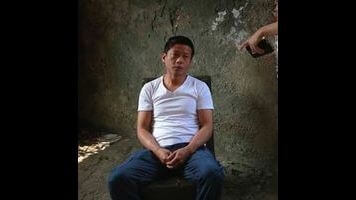How’s this for a fans-only affair: Tsai Ming-Liang, Taiwanese director of largely wordless movies about people trying to connect with one another, sits in a dilapidated farmhouse, trying to get Lee Kang-Sheng, his leading man and onscreen alter ego, to open up emotionally. The two men sit in non-matching green leather lounge chairs and wear flip-flops, which dangle precariously from their feet whenever they cross their legs. Tsai does two-thirds of the talking. He asks questions like “Will you cry when I die?”, “Do you ever hate me?”, and “How do you like my cooking?” The camera is positioned at an omniscient high angle, putting the two into a corner of the frame, and never moves. The whole thing is 137 minutes long, and there are only three cuts.
This is the gist of Tsai’s therapy-session-like documentary Afternoon, in which the filmmaker, fixated on unconventional relationships and on moods of silence, turns the camera on himself to voice his feelings about Lee, his best friend, business partner, and housemate, and the star of every one of his movies since Rebels Of The Neon God. Tsai is gay and talkative; Lee is straight and tight-lipped. They barely mention the movies they’ve made together; in fact, they barely mention movies at all. The set-up suggests a staged self-intervention, and the experience is clearly trying for both men: Tsai starts sobbing before the 10 minute mark, and Lee often locks into an evasive empty stare. Who really needs this, apart from these two guys?
Candid and audaciously minimalist, Afternoon risks self-indulgence, but comes out with insight. Part of the reason is that the friendship between Tsai and Lee is legitimately interesting and complicated: the queer artist and the largely silent collaborator who’d wait for him outside of bath houses and cruising spots when they would travel abroad for film festivals. It seems at once comfortable and precarious, sustained by the unspoken and unresolved. A viewer gets the sense that Tsai is asking questions he legitimately doesn’t know the answer to and has avoided for decades. (Few seem as hard for him to pose as, “My sexual orientation: Has it ever bothered you?”) As the sun shifts outside the window, so does the mood in the room, from tense to relaxed to downright elegiac, as though the two weren’t present, but remembering each other.
As a self-portrait, it’s remarkably off-the-cuff; Tsai extrapolates on his anxieties about death, deeply held Buddhist beliefs, and the worries about permanence and impermanence that both suggest, all the while struggling to phrase his unrequited attraction to Lee. (Lee, on the other hand, interjects deadpan jokes, only opening up when he gets to talk about sports cars.) Though it isn’t for everyone, Afternoon is just as unique as the duo’s other work. What could have been little more than a Blu-ray extra in the hands of a different filmmaker becomes an exploration of the boundaries of sex, longing, and personal need, and of the theme that’s been central to Tsai’s work since the beginning: a bond too complex to be put into words.









![HBO teases new Euphoria, Larry David, and much more in 2026 sizzle reel [Updated]](https://img.pastemagazine.com/wp-content/avuploads/2025/12/12100344/MixCollage-12-Dec-2025-09-56-AM-9137.jpg)































